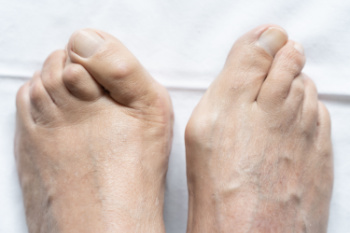Connect With Us
Blog
Items filtered by date: November 2024
Facts About Bunion Surgery

Bunion removal surgery, also known as a bunionectomy, is a common treatment for severe bunions that cause pain, difficulty walking, or deformity. A bunion occurs when the big toe joint becomes misaligned, causing a bump on the side of the foot. Surgery is typically considered when non-surgical treatments, such as wearing orthotics or changing footwear, do not provide relief. Choosing surgery depends on the severity of the bunion, the level of discomfort, and its impact on daily activities. The procedure itself involves realigning the bones in the toe, removing the bump, and sometimes fusing the joint or cutting bones to correct the alignment. Recovery time varies but often requires several weeks of rest and limited movement. If you have a bunion that is causing you discomfort, it is suggested that you consult a podiatrist who can determine if bunion surgery is right for you.
Foot surgery is sometimes necessary to treat a foot ailment. To learn more, contact one of our podiatrists of Garnet & Carbonell, DPM, LLC. Our doctors will assist you with all of your foot and ankle needs.
When Is Surgery Necessary?
Foot and ankle surgery is generally reserved for cases in which less invasive, conservative procedures have failed to alleviate the problem. Some of the cases in which surgery may be necessary include:
- Removing foot deformities like bunions and bone spurs
- Severe arthritis that has caused bone issues
- Cosmetic reconstruction
What Types of Surgery Are There?
The type of surgery you receive will depend on the nature of the problem you have. Some of the possible surgeries include:
- Bunionectomy for painful bunions
- Surgical fusion for realignment of bones
- Neuropathy decompression surgery to treat nerve damage
Benefits of Surgery
Although surgery is usually a last resort, it can provide more complete pain relief compared to non-surgical methods and may allow you to finally resume full activity.
Surgical techniques have also become increasingly sophisticated. Techniques like endoscopic surgery allow for smaller incisions and faster recovery times.
If you have any questions please feel free to contact our offices located in Palmetto Bay, South Miami, and Homestead, FL . We offer the newest diagnostic and treatment technologies for all your foot and ankle needs.
What Is a Foot Corn?

Foot corns, also known as clavus, are thickened areas of skin that develop in response to friction and pressure. They commonly appear on the top or sides of the toes, as well as on the soles of the feet. The primary causes of corns include wearing ill-fitting shoes that rub against the feet, engaging in repetitive activities, and having abnormal foot mechanics. Symptoms typically include localized pain, tenderness, and a hard, raised bump on the skin. While corns are generally harmless, they can become uncomfortable and lead to further complications if not addressed. Preventive measures, such as choosing properly fitting footwear, can help reduce the risk of developing corns. If you have developed a corn that is uncomfortable or painful, it is suggested that you consult a podiatrist who can offer you effective relief and prevention tips.
If you have any concerns regarding your feet and ankles, contact one of our podiatrists of Garnet & Carbonell, DPM, LLC. Our doctors will treat your foot and ankle needs.
Corns: What Are They? and How Do You Get Rid of Them?
Corns can be described as areas of the skin that have thickened to the point of becoming painful or irritating. They are often layers and layers of the skin that have become dry and rough, and are normally smaller than calluses.
Ways to Prevent Corns
There are many ways to get rid of painful corns such as wearing:
- Well-fitting socks
- Comfortable shoes that are not tight around your foot
- Shoes that offer support
Treating Corns
Treatment of corns involves removing the dead skin that has built up in the specific area of the foot. Consult with Our doctors to determine the best treatment option for your case of corns.
If you have any questions please feel free to contact our offices located in Palmetto Bay, South Miami, and Homestead, FL . We offer the newest diagnostic and treatment technologies for all your foot and ankle needs.
Wounds That Don't Heal Need to Be Checked
Causes of Foot Stress Fractures

Stress fractures are tiny cracks in the bone that often affect the metatarsal shafts in the foot. Unlike fractures caused by a single injury, foot stress fractures result from repetitive pounding and overuse that surpasses the ability of muscles to absorb shock. This is common among runners who increase their training intensity too quickly or people who walk long distances without proper conditioning. Poor footwear with insufficient shock absorption, a high arch foot structure, and osteoporosis can raise the risk of developing stress fractures in the feet. Symptoms typically start as mild pain in the forefoot after a long or intense workout. Gradually the pain occurs earlier with each activity until it becomes constant and severe. A podiatrist can diagnose foot stress fractures through a physical exam and digital imaging tests. Relief includes reducing the offending activity, finding more protective footwear, and in some cases, using crutches to allow the bones to heal. If you believe you have foot stress fractures, it is suggested that you schedule an appointment with a podiatrist for an exam and treatment.
Stress fractures occur when there is a tiny crack within a bone. To learn more, contact one of our podiatrists from Garnet & Carbonell, DPM, LLC. Our doctors can provide the care you need to keep you pain free and on your feet.
How Are They Caused?
Stress fractures are the result of repetitive force being placed on the bone. Since the lower leg and feet often carry most of the body’s weight, stress fractures are likely to occur in these areas. If you rush into a new exercise, you are more likely to develop a stress fracture since you are starting too much, too soon. Pain resulting from stress fractures may go unnoticed at first, however it may start to worsen over time.
Risk Factors
- Gender – They are more commonly found in women compared to men.
- Foot Problems – People with unusual arches in their feet are more likely to develop stress fractures.
- Certain Sports – Dancers, gymnasts, tennis players, runners, and basketball players are more likely to develop stress fractures.
- Lack of Nutrients – A lack of vitamin D and calcium may weaken the bones and make you more prone to stress fractures
- Weak Bones – Osteoporosis can weaken the bones therefore resulting in stress fractures
Stress fractures do not always heal properly, so it is important that you seek help from a podiatrist if you suspect you may have one. Ignoring your stress fracture may cause it to worsen, and you may develop chronic pain as well as additional fractures.
If you have any questions, please feel free to contact our offices located in Palmetto Bay, South Miami, and Homestead, FL . We offer the newest diagnostic and treatment technologies for all your foot care needs.
Tips on Finding the Right Hiking Boots

Choosing the right hiking boots is important for your foot health and comfort on the trails. Hiking can put a lot of stress on your feet, especially if you are carrying a heavy pack or are hiking on uneven terrain. The proper hiking boots provide the necessary support, stability, and cushioning to reduce the risk of foot pain, blisters, and even long-term injuries like plantar fasciitis or tendonitis. When selecting hiking boots, it is important to consider the type of hiking you plan to do. Lightweight boots may be suitable for shorter day hikes on well-maintained trails. For more challenging terrain or longer backpacking trips, midweight or heavy-duty boots provide better ankle support and protection from rough surfaces. Getting the right fit is equally important as boots that are too tight or too loose can lead to foot or ankle pain and injury. A podiatrist can help by assessing your foot’s structure and gait in order to determine which boots or orthotics will provide the best fit and support. If you have foot problems as a result of hiking, it is suggested that you schedule an appointment with a podiatrist.
It is important to find shoes that fit you properly in order to avoid a variety of different foot problems. For more information about treatment, contact one of our podiatrists from Garnet & Carbonell, DPM, LLC. Our doctors will treat your foot and ankle needs.
Proper Shoe Fitting
Shoes have many different functions. They cushion our body weight, protect our feet, and allow us to safely play sports. You should always make sure that the shoes you wear fit you properly in order to avoid injuries and deformities such as: bunions, corns, calluses, hammertoes, plantar fasciitis, stress fractures, and more. It is important to note that although a certain pair of shoes might be a great fit for someone else, that doesn’t mean they will be a great fit for you. This is why you should always try on shoes before buying them to make sure they are worth the investment. Typically, shoes need to be replaced ever six months to one year of regular use.
Tips for Proper Shoe Fitting
- Select a shoe that is shaped like your foot
- Don’t buy shoes that fit too tight, expecting them to stretch to fit
- Make sure there is enough space (3/8” to ½”) for your longest toe at the end of each shoe when you are standing up
- Walk in the shoes to make sure they fit and feel right
- Don’t select shoes by the size marked inside the shoe, but by how the shoe fits your foot
The shoes you buy should always feel as good as they look. Shoes that fit properly will last longer, feel better, and improve your way of life each day.
If you have any questions, please feel free to contact our offices located in Palmetto Bay, South Miami, and Homestead, FL . We offer the newest diagnostic and treatment technologies for all your foot care needs.

